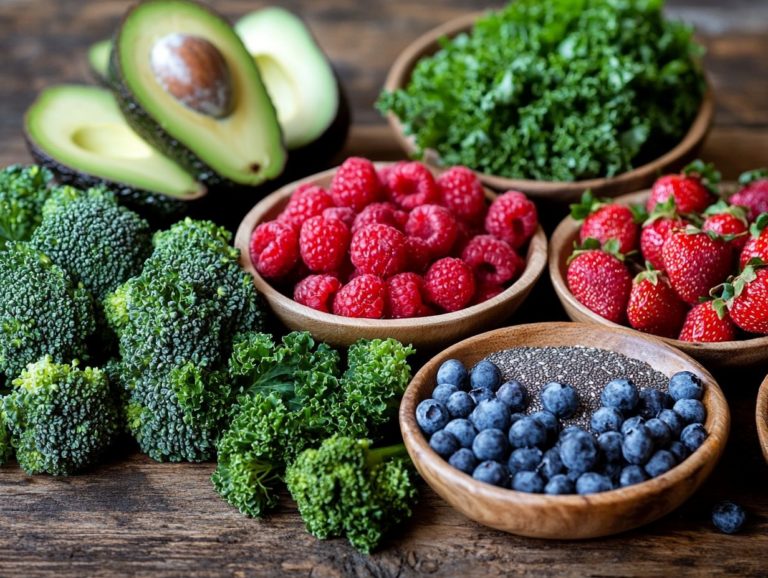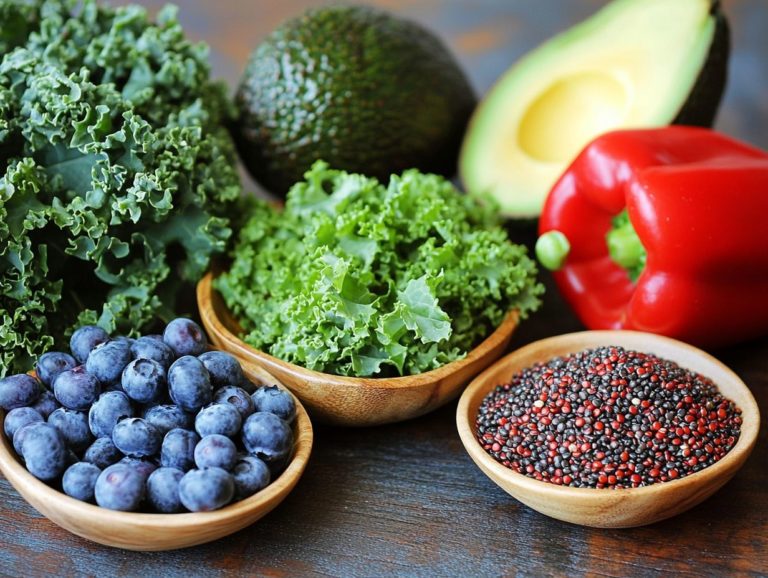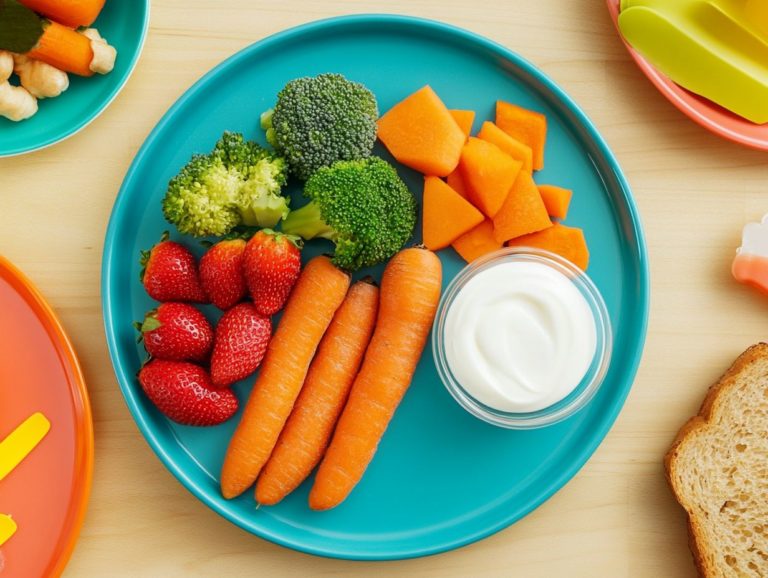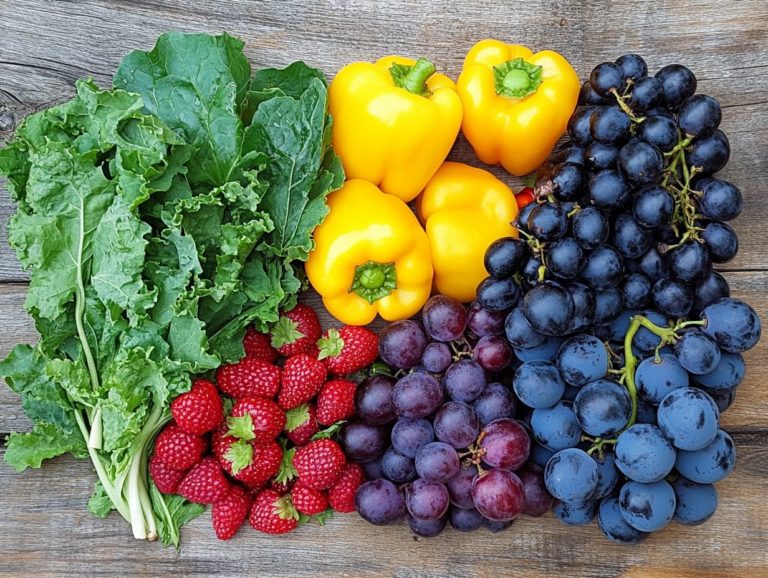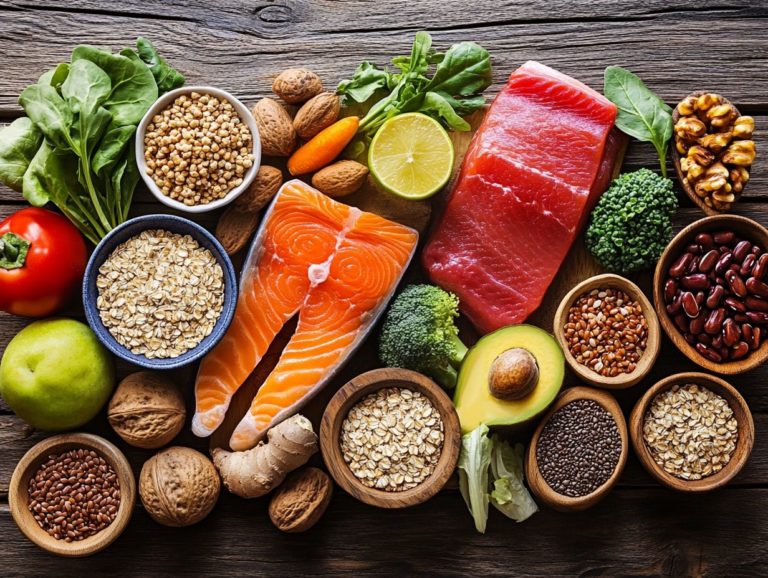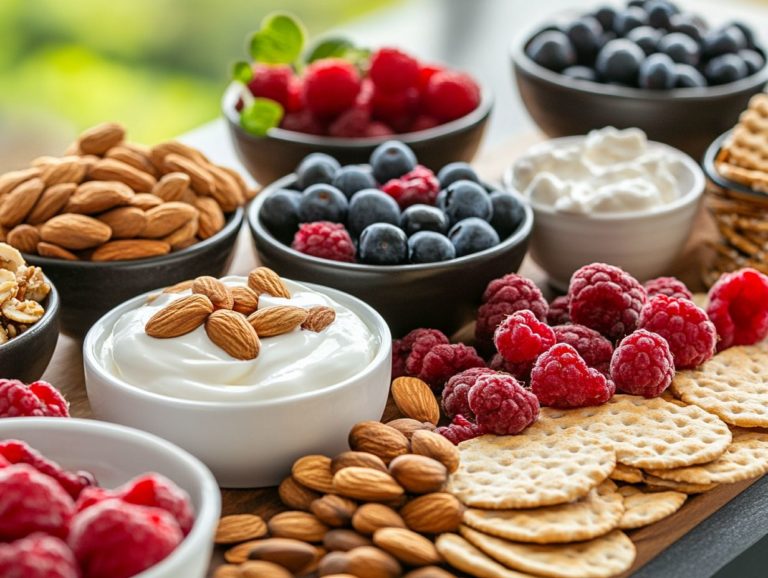5 Foods to Increase Your Nutrient Absorption
Unlocking the benefits of a healthy diet goes beyond food choices; it s about how well your body absorbs vital nutrients.
Discover five powerhouse foods that can boost your nutrient absorption, from dark leafy greens to zesty citrus fruits.
We ll explore what nutrient absorption is and the factors that influence it, along with practical tips for incorporating these foods into your meals.
Start maximizing the value of everything you consume today!
Contents
- Key Takeaways:
- 1. Dark Leafy Greens
- 2. Fermented Foods
- 3. Healthy Fats
- 4. Citrus Fruits
- 5. Nuts and Seeds
- What Is Nutrient Absorption and Why Is It Important?
- Frequently Asked Questions
- What are 5 foods that can help increase nutrient absorption?
- Why are leafy greens important for nutrient absorption?
- What nutrients can be found in nuts and seeds?
- How does fatty fish aid in nutrient absorption?
- What role do citrus fruits play in nutrient absorption?
- Are fermented foods beneficial for nutrient absorption?
Key Takeaways:
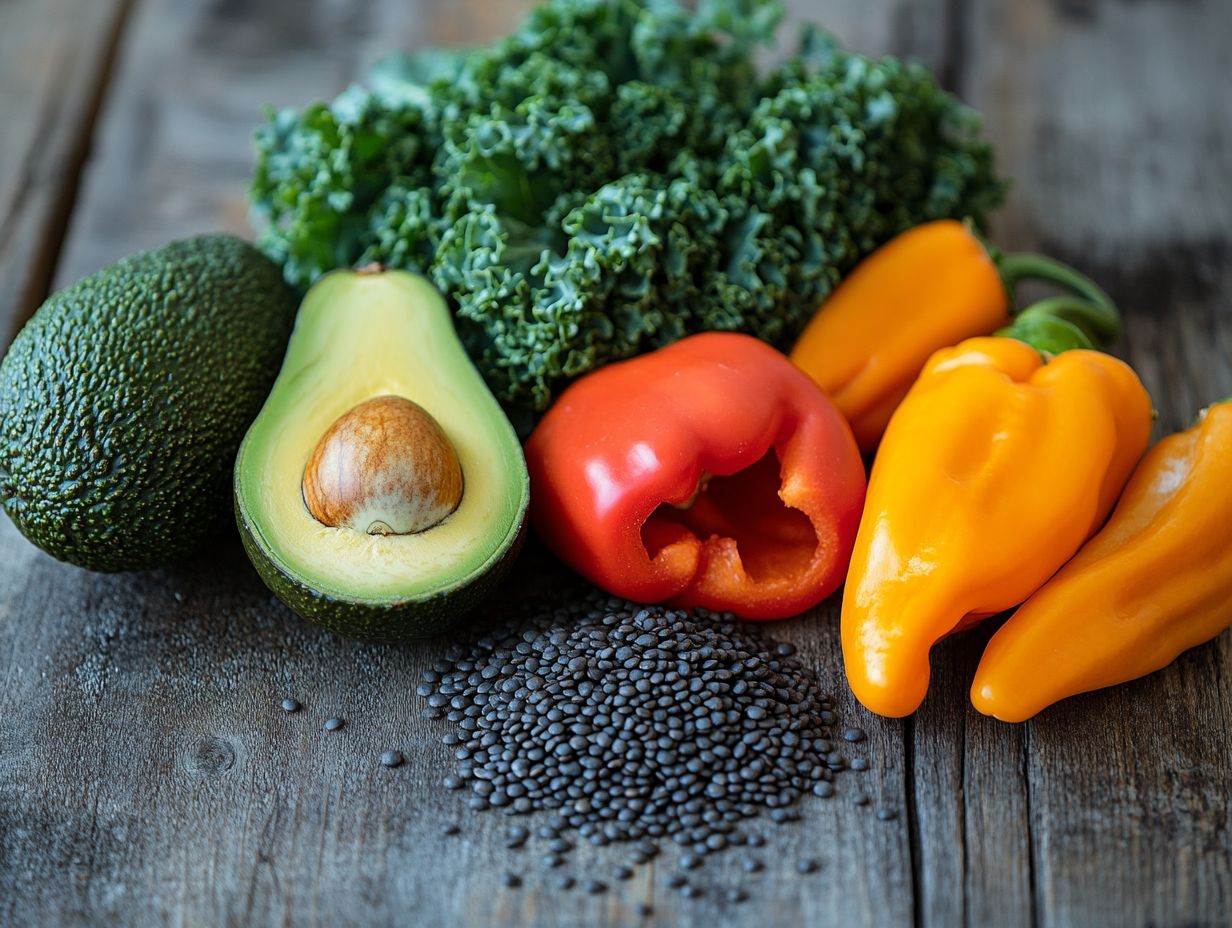
- Include dark leafy greens like spinach and kale for their vitamins and minerals.
- Incorporate fermented foods such as yogurt and kimchi to support gut health.
- Add healthy fats like avocado and olive oil to help absorb fat-soluble vitamins.
1. Dark Leafy Greens
Dark leafy greens like spinach, kale, and collard greens are nutritional powerhouses. They re rich in essential vitamins such as A and K, which are crucial for nutrient absorption.
These greens are packed with dietary fiber, promoting a healthy gut microbiome and aiding digestion. For example, kale not only provides vitamin C and calcium but also has fiber that helps with digestive issues.
To maximize their benefits, steam or saut them with a bit of olive oil to preserve nutrients. Pairing them with lemon juice or avocados can further enhance the absorption of fat-soluble vitamins.
2. Fermented Foods
Fermented foods like yogurt, kimchi, and sauerkraut are rich in probiotics, which support your gut health. These foods foster a thriving digestive system filled with beneficial bacteria that help absorb nutrients efficiently.
Consuming these foods regularly creates an optimal environment for digestive enzymes to work effectively. Aim to include a serving of fermented foods in each meal. You might enjoy:
- Sprinkling sauerkraut over salads
- Blending yogurt into smoothies
- Serving kimchi as a side dish
Starting your day with a probiotic-rich breakfast can set a positive tone for nutrient uptake throughout the day.
3. Healthy Fats
Healthy fats from sources like olive oil, avocados, and fatty fish like salmon can greatly improve your absorption of fat-soluble vitamins like E and D. These nutrients are vital for immune support, skin health, and bone strength.
Combining these healthy fats with colorful fruits and vegetables maximizes their benefits. For instance, drizzling olive oil over a salad enhances flavor and boosts the absorption of antioxidants.
Pairing avocado with leafy greens helps your body utilize the vitamins in the greens efficiently. Experiment with grilling salmon and serving it with roasted vegetables drizzled in olive oil for delicious nutrient-rich meals.
Incorporate these foods into your diet right away for better health!
We d love to hear your experiences. Share your tips on how you incorporate these foods into your meals!
4. Citrus Fruits
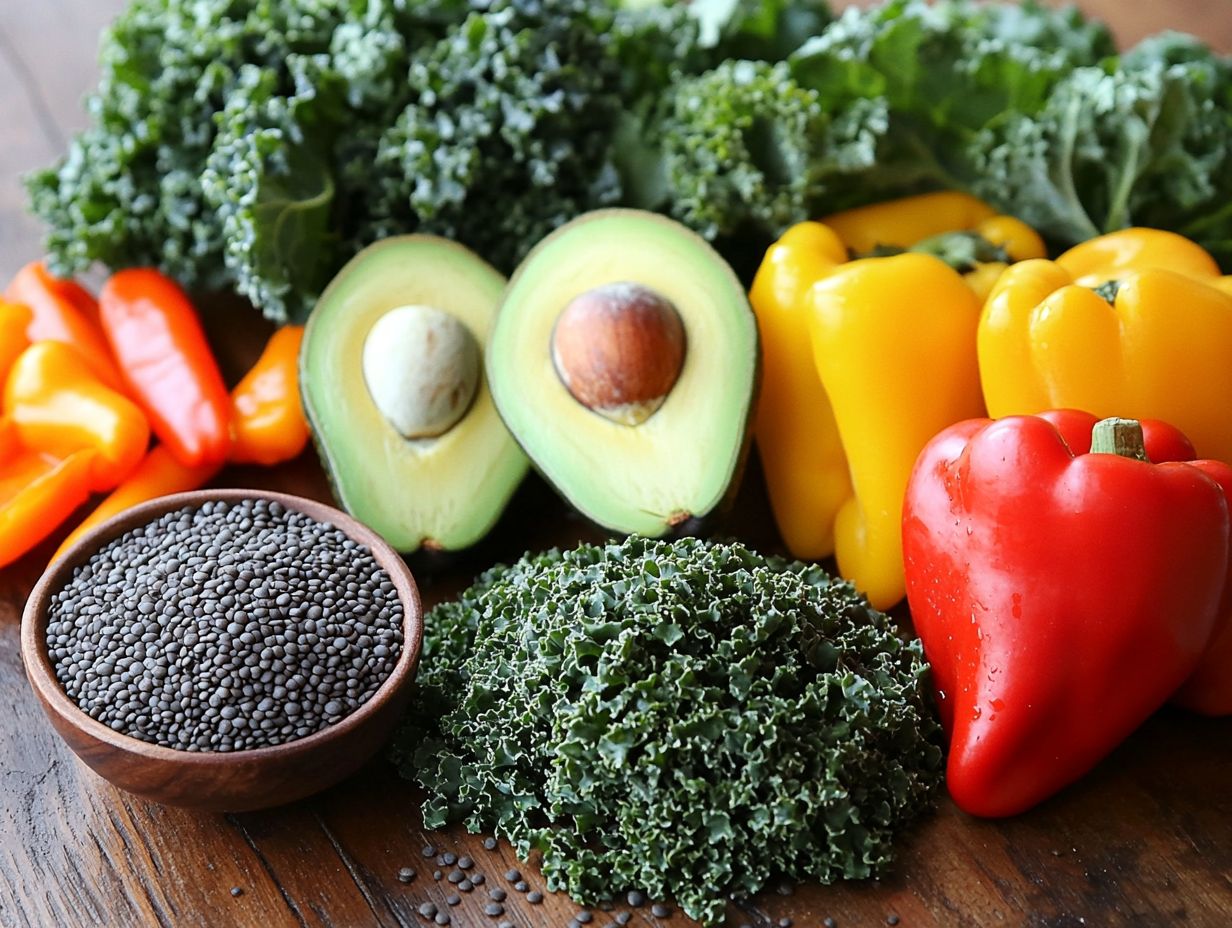
Citrus fruits, such as oranges and grapefruits, are celebrated for their impressive vitamin C content. This vitamin not only bolsters your immune system but also enhances the absorption of iron and other essential nutrients when paired with iron-rich foods.
The vitamin C found in these fruits helps convert plant-based iron like that in spinach and lentils into a more absorbable form. When you indulge in a spinach salad drizzled with lemon juice, you significantly boost iron absorption compared to enjoying the salad on its own.
Incorporating citrus zest into your dishes or using lemon juice as a marinade adds vibrant flavors while effectively preserving that precious vitamin C content.
Remember to use gentle cooking techniques like steaming instead of boiling to maintain vitamin levels. This ensures both taste and nutritional benefits are maximized in every meal you prepare.
5. Nuts and Seeds
Nuts and seeds, such as almonds, chia seeds, and flaxseeds, are tiny powerhouses bursting with nutrients. They offer healthy fats, proteins, and essential minerals that support nutrient absorption and overall health when woven into a balanced diet.
These foods are packed with antioxidants and fiber, enhancing digestion and promoting a satisfying feeling of fullness. For instance, almonds are rich in vitamin E, which helps shield your cells from oxidative stress.
Chia seeds boast a remarkable amount of omega-3 fatty acids. Start adding these nutrient-dense foods to your meals today for an instant health boost! Simply sprinkle flaxseeds into your smoothies, add chia seeds to your yogurt, or enjoy a handful of mixed nuts as a satisfying snack.
Their versatility allows you to include them in everything from salads to baked goods, elevating both flavor and nutritional value with ease.
What Is Nutrient Absorption and Why Is It Important?
Nutrient absorption is the fascinating process through which your digestive system breaks down food and assimilates essential vitamins, minerals, and other nutrients into your bloodstream. Nutrient absorption is crucial because it ensures your body receives the vitamins and minerals it needs to function well.
The journey begins in your mouth and travels through your stomach and intestines, where digestive enzymes and acids dismantle complex food components. As this intricate process unfolds, your intestinal lining, adorned with tiny villi and microvilli, transfers these nutrients into your bloodstream.
Many factors can influence nutrient bioavailability, including the presence of other dietary components, your gut health, and even genetic predispositions. Embracing a diet rich in diverse, whole foods maximizes nutrient extraction and cultivates a robust immune system.
This ensures that your body functions optimally and remains well-equipped to fend off illness.
What Factors Can Affect Nutrient Absorption?
Various factors influence your nutrient absorption, such as compounds that can interfere with nutrient absorption, cooking methods that cause nutrient loss, and your individual digestive health. These elements can affect nutrient deficiencies and overall well-being.
Your dietary choices, particularly the balance of macronutrients and the variety of fruits and vegetables you consume, play a crucial role in this process. For example, incorporating colorful produce significantly enhances your vitamin intake and improves gut health.
Opting for cooking techniques like steaming or saut ing helps retain vital nutrients better than boiling, which can cause nutrients to leach into the water.
Personal health conditions, such as hormonal imbalances or gastrointestinal disorders, can complicate nutrient absorption. This highlights the importance of a holistic approach to boost nutrient absorption and improve your health.
How Do These Foods Help with Nutrient Absorption?
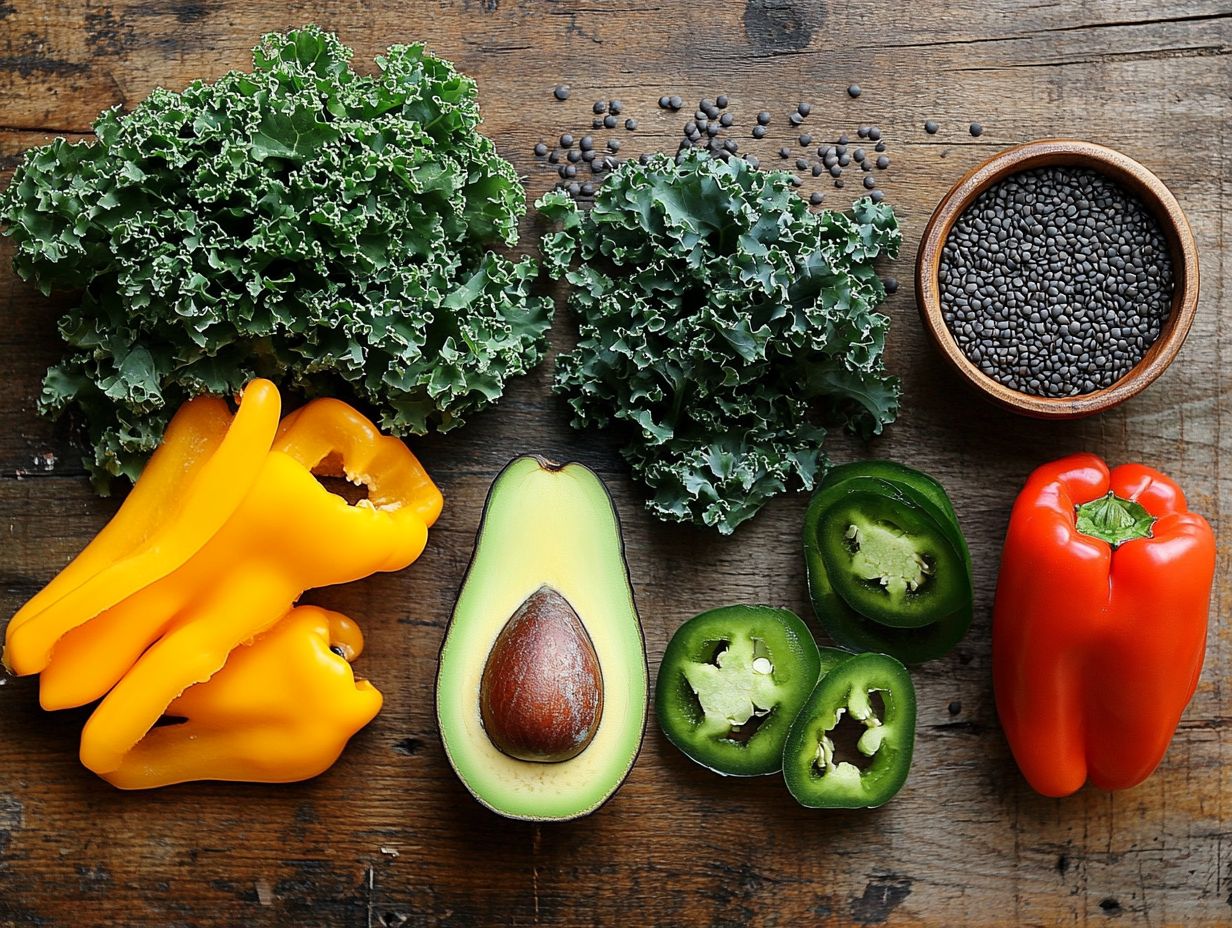
Certain foods can significantly enhance your nutrient absorption through food pairings that work well together. This means you’ll enjoy better nutrient benefits and a higher overall intake.
For example, when you pair vitamin C-rich foods, like bell peppers or citrus fruits, with iron sources such as spinach or lentils, you can dramatically boost your iron absorption. This is especially beneficial if you’re following a plant-based diet.
Another fantastic combination is healthy fats, like avocado, with fat-soluble vitamins found in greens. This pairing increases the bioavailability of nutrients like vitamin K. Picture a fresh spinach salad topped with slices of avocado and a zesty citrus vinaigrette it s a delightful way to pack in easily absorbable nutrients.
Similarly, when you combine tomatoes with olive oil, you enhance the absorption of the antioxidant lycopene. This makes classic dishes like pasta with marinara sauce an even healthier option on your table.
What Other Foods Can Help Increase Nutrient Absorption?
Consider adding prebiotic-rich fruits and vegetables to your diet. This is crucial for optimizing nutrient absorption and elevating your overall nutrient-rich meals.
For instance, incorporating foods like bananas, asparagus, and onions into your meals can dramatically increase your prebiotic intake. These ingredients blend effortlessly into salads, smoothies, or stir-fries, enhancing both flavor and gut health.
Probiotics, found in yogurt, kefir, and fermented foods like sauerkraut, also play an essential role in supporting digestion. A simple yet effective method to enjoy these is by swirling yogurt into your breakfast cereals or enjoying a small serving of sauerkraut as a side dish at dinner.
By making these thoughtful adjustments, you can greatly improve your gut health, which in turn enhances your nutrient absorption capabilities.
Are There Any Foods That Can Decrease Nutrient Absorption?
Certain foods can impede your body s nutrient absorption due to anti-nutrients or compounds that disrupt the digestive process. Over time, this interference can lead to nutrient loss and potential deficiencies.
For example, legumes and grains are known to contain phytic acid, a compound that binds essential minerals like iron and zinc, making them less accessible for absorption. Similarly, while certain green leafy vegetables are packed with nutrients, they may also contain oxalates that inhibit calcium absorption.
To mitigate these effects, consider soaking, sprouting, or fermenting grains and legumes before cooking. These techniques effectively lower anti-nutrient levels, enhancing nutrient availability.
Pairing foods rich in vitamin C such as citrus fruits with iron-rich plant foods can significantly boost mineral absorption, allowing your body to better utilize these vital nutrients.
How Can One Incorporate These Foods into Their Diet?
To truly maximize your nutrient absorption and support a vibrant, healthy diet, effortlessly incorporate nutrient-rich foods by employing a variety of cooking techniques that enhance both flavor and nutritional value.
One effective strategy is to add dark leafy greens, like kale or spinach, into your smoothies or salads. Toss in a handful to your favorite recipes for an instant nutrient boost.
When it comes to fermented foods, consider enjoying yogurt or sauerkraut as a delightful side dish or topping; they fit seamlessly into breakfast bowls or tacos.
Don t underestimate the power of healthy fats, such as avocado or olive oil they not only elevate the flavor of your dishes but also aid in the absorption of essential vitamins and minerals.
Brighten up your meals with citrus fruits, squeezing them over salads or incorporating them into marinades. A sprinkle of nuts and seeds can add a satisfying crunch and a protein punch to yogurt, oatmeal, or roasted vegetables.
Remember, meal planning is key; prepping these wholesome ingredients in advance encourages smarter food choices throughout the week, making it easy to indulge in nutritious options regularly.
Frequently Asked Questions
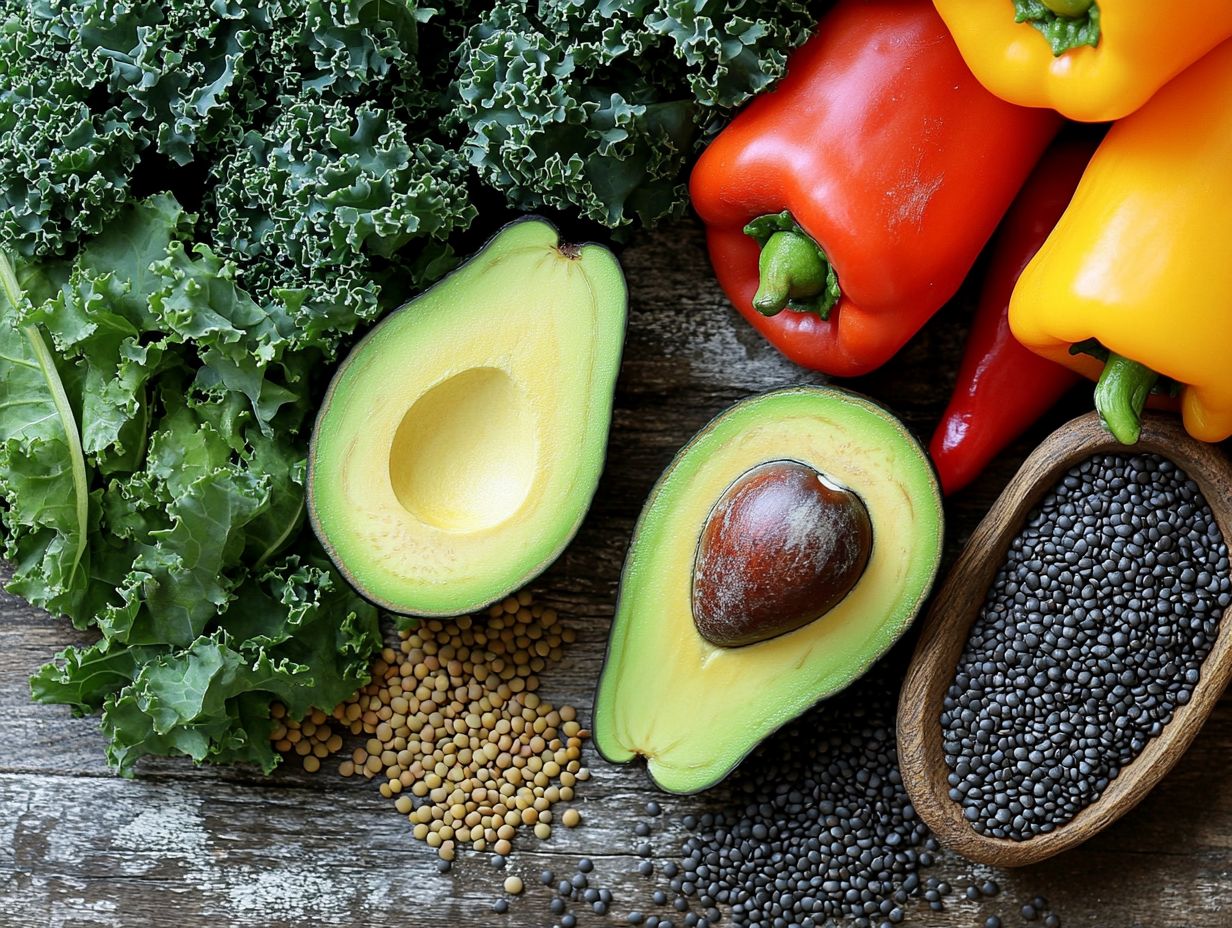
What are 5 foods that can help increase nutrient absorption?
Here are five foods that boost nutrient absorption: leafy greens, nuts and seeds, fatty fish, citrus fruits, and fermented foods.
Why are leafy greens important for nutrient absorption?
Leafy greens help nutrient absorption. They are high in fiber, promoting a healthy gut environment.
What nutrients can be found in nuts and seeds?
Nuts and seeds are packed with healthy fats, fiber, protein, vitamins, and minerals. These nutrients enhance your body s ability to absorb other nutrients.
How does fatty fish aid in nutrient absorption?
Fatty fish like salmon and mackerel are rich in omega-3 fatty acids. These can reduce inflammation and improve the absorption of vital nutrients like vitamin D and calcium.
What role do citrus fruits play in nutrient absorption?
Citrus fruits are loaded with vitamin C, which boosts iron absorption from plant foods. They also contain antioxidants to protect your cells and enhance nutrient uptake.
Are fermented foods beneficial for nutrient absorption?
Yes! Fermented foods, such as yogurt, kimchi, and sauerkraut, contain probiotics that support gut health. This results in better nutrient absorption from your meals.

